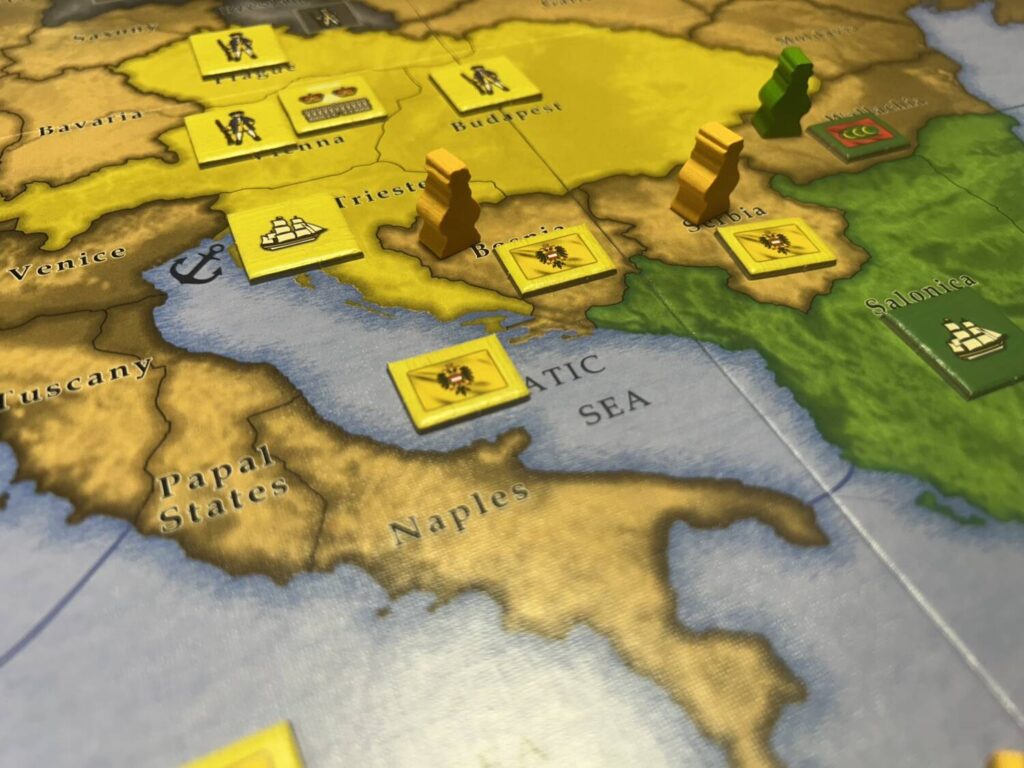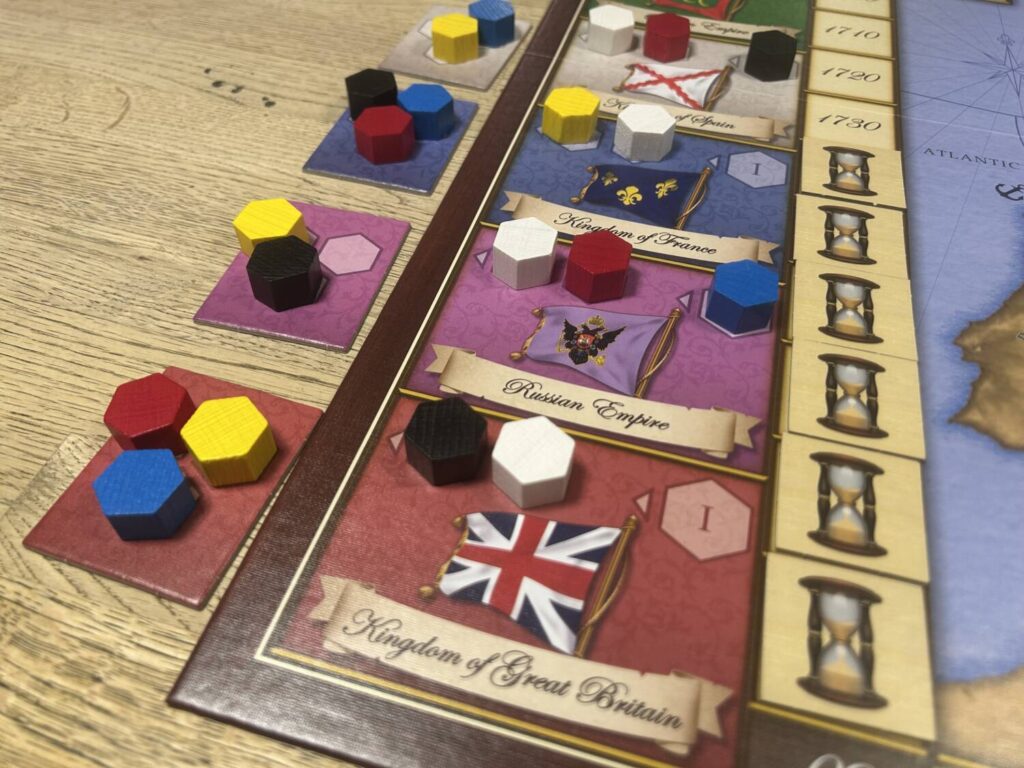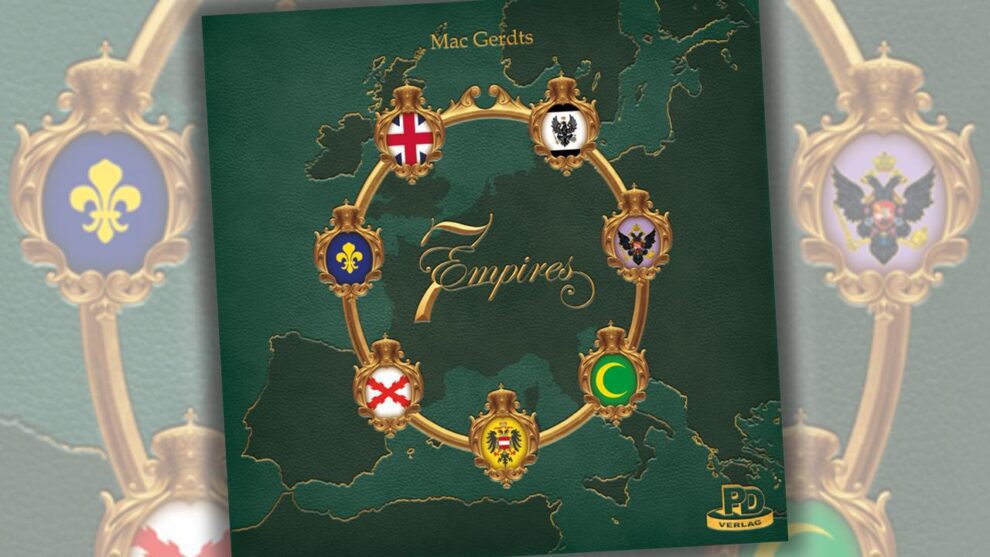Disclosure: Meeple Mountain received a free copy of this product in exchange for an honest, unbiased review. This review is not intended to be an endorsement.
Every now and then, I come across a board game design in which the pieces on the board don’t really belong to anyone. It never fails to enchant me. I love building board presence, but there’s something about the impermanence of possession in Pax Pamir, the inability to take ownership for granted, that I find particularly rich. Develop a position all you want; it might play to my advantage. The idea that nothing on the board is yours is antithetical to several decades of board game design. Even in cooperative anti-colonial designs like Spirit Island, you have presence on the board, physical evidence that you, and you in particular, were there.
Though I am hardly an expert, Mac Gerdts’s 2006 release Imperial is the earliest design I know of that fills the board with pieces belonging to no one player. That map of Europe is packed to the gills with the buildings and armies of the Great Nations of Europe, but players aren’t playing as the nations. They are the great barons of capital, manipulating European conflict to their individual advantage. The second version, Imperial 2030, moved things into the (increasingly near) future. For 7 Empires, a new release from publisher PD Verlag, the conflict is moved back a century or two to the age of the Hapsburgs and the Prussians, the French and the Spanish, the Ottomans and the English.

A Slice of the Pie
These six emp—wait. Six?
Ah.
I forgot the Russians.
Кусок пирога
Though we think of empires and their leaders as the great figures of history, 7 Empires shows them as mere figureheads. It is the players—unlike the previous iterations of this design, the players have no specified real-world role—who choose what each empire does.
On your turn, you choose an available empire to operate, then an action for them to perform. You can establish cities, deploy troops, move troops, get into fights, or score for your empire, depending on which three actions are presently available. 7 Empires uses a clever and elegant system in which the two most recently used actions for any given empire can’t be used. It is similar in feel to the many Gerdts designs that use roundels, though this ultimately allows for more interesting permutational changes. The action selection mechanism is my favorite part of 7 Empires, a simple and elegant system that rewards planning ahead while forcing diverse approaches to play.
As for the Influence, acquisition is simple: most rounds, you simply take it when it’s your turn to do so. But the implications of your simple choices get gnarly fast. Empires can only operate once per round, and the empires you can choose on your turn are restricted by the amount of Influence you have in the countries still available. If you try to operate an empire in which you have no Influence, you surrender the action to the player who has the Monarch.
7 Empires works well up to its maximum player count of 6, but this is an aspect of the design that’s better served in the middle-ground of its range. At four players, the finer points of the Influence system kick in, with players making choices based on how the rest of the round will play out. At higher player counts, opportunities to make those kinds of choices are limited.

Balance-Schmalance
An interesting point about the design of 7 Empires: some empires simply are stronger than others. At first, that feels like a mistake, but that’s very much part of the point. The Great Nations of Europe weren’t evenly matched in all regards, so why should they be here? Designing a game in which all seven empires are evenly matched would be both fine and doable, but it wouldn’t be particularly accurate to history, and it would remove certain pressures. Don’t let one player gather all the Influence in France. It’s more interesting that way.
Gerdts has found a way instead to balance through encouraging quietly asymmetrical approaches. Some nations want to get into fights. Others want to hold their borders and score frequently. England wants to take over as much of the sea as possible. The Ottomans can charge into Russia if they want. I just don’t know that I’d recommend it.
Scoring is a matter of simple counting. Huge swings are not only possible, but likely. Final scoring is paid out like dividends, with each nation’s score—astonishingly close across several games, but not so close that good play feels irrelevant—determining that nation’s ranking, which in turn determines the points-per-Influence yield.
7 Empires streamlines Imperial and Imperial 2030, reducing the playtime and lowering the overall complexity. From what I can tell, it succeeds admirably. Combat is simple and determinative, triggered any time troops share a space. The action selection mechanism is clean. The board looks like it was published in 1998. Sometimes I mean that as a compliment. Here it’s probably 50/50. 7 Empires plays quickly, the outcome is often unknowable, and the shifting mutual interests that make up its core lead to terrific moments at the table.











